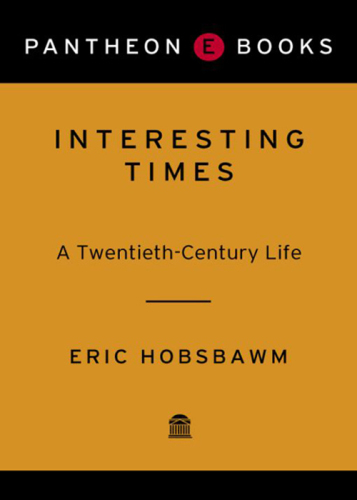
Interesting Times
A Twentieth-Century Life
کتاب های مرتبط
- اطلاعات
- نقد و بررسی
- دیدگاه کاربران
نقد و بررسی

Starred review from July 28, 2003
"The past is another country, but it has left its mark on those who once lived there," writes noted historian Hobsbawm in this lyrical, pungent and provocative memoir. Known for his histories of the 19th and 20th centuries, Hobsbawm examines this material from a far more intimate perspective and details his personal and intellectual life from his birth into a Jewish family in 1917 to the present. Weaving insightful material into a broader historical tapestry, he moves gracefully from his parents' troubled marriage to his early Communist political work in Berlin in 1933, and his family's flight to England with the rise of Hitler. At university, he became one of the "Cambridge Reds" and professionally was known as a "Marxist historian"—but, he comments, "historical understanding is what I am after, not agreement, approval or sympathy." In the forthright style that has made his scholarly work so accessible, Hobsbawm writes as easily about his love of jazz as about the complicated problems the Cambridge-based Historians' Group of the Communist Party had with the encroaching hard line of the Soviet government. While Hobsbawm's life is fascinating, it is his pungent observations on today's world that bring a sharp contemporary edge to his life and memoir. He has sharp things to say about Zionism, and of contemporary America he writes, "the US empire does not know what it wants or can do with its power.... It merely insists that those who are not with it are against it." This important work augments the life's work of one of the last century's most important historians.

August 1, 2003
Any list of the half-dozen or so most respected 20th-century historians writing in English would surely include Hobsbawm's name. That for most of his life the octogenarian (b. 1917) belonged to a particularly orthodox Communist Party branch (British) of the poisoned Stalinist tree yet still commands such great admiration reflects his intellectual might and intrinsic integrity. Hobsbawm's sweeping series on 19th-century western Europe (The Age of Capital, The Age of Revolution, and The Age of Empire) is a standard international assignment even by instructors disinclined to hold any brief for socialism as salvation. Still, his autobiography, which sweeps from birth in Egypt to teaching at Cambridge, proves mostly a book for groupies of historians' private lives. Here readers will learn that Hobsbawm's avowed allegiance to Moscow was shaken even before the Khrushchev denunciations; that he constructs beautifully baroque, everything-but-the-kitchen-sink sentences that reward rereading; and that his genuine modesty does not inhibit him from habitual name dropping, albeit of celebrities who made their mark in the limitedly appealing venue of public intellectualism. Recommended only for serious academic and research collections.-Scott H. Silverman, Bryn Mawr Coll. Lib., PA
Copyright 2003 Library Journal, LLC Used with permission.

July 1, 2003
Hobsbawm's career as a public intellectual has been defined by his celebrated histories of the nineteenth and twentieth centuries (" The Age of Extremes 1914-1991 "[1994], for example) and by his unflinching Marxism. His autobiography delineates his uncommon trajectory through the twentieth century: birth in Alexandria, childhood as a Jew in Austria and Hitler's Berlin, intellectual maturation in Cambridge, and a multinational academic career to follow. It's an interesting life, to be sure, but more interesting is his perspective on his communist past and the academic life. Hobsbawm's retrospective musings are nostalgic yet honest about the shortcomings of international socialism; they reveal the gently conflicted perspective of one whose political vision hasn't come to fruition, yet who has enjoyed a fruitful life regardless. And yet, within his lived narrative, his praise of jazz and France and certain academic peers, Hobsbawm's discussion of the emerging "global village" suggests a new appeal to socialism and hope for the future. Hobsbawm readers will enjoy the background and a handful of juicy autobiographical tidbits (how he lost his virginity, for example); neophytes will likely find themselves intrigued enough to look at his earlier work.(Reprinted with permission of Booklist, copyright 2003, American Library Association.)

























دیدگاه کاربران